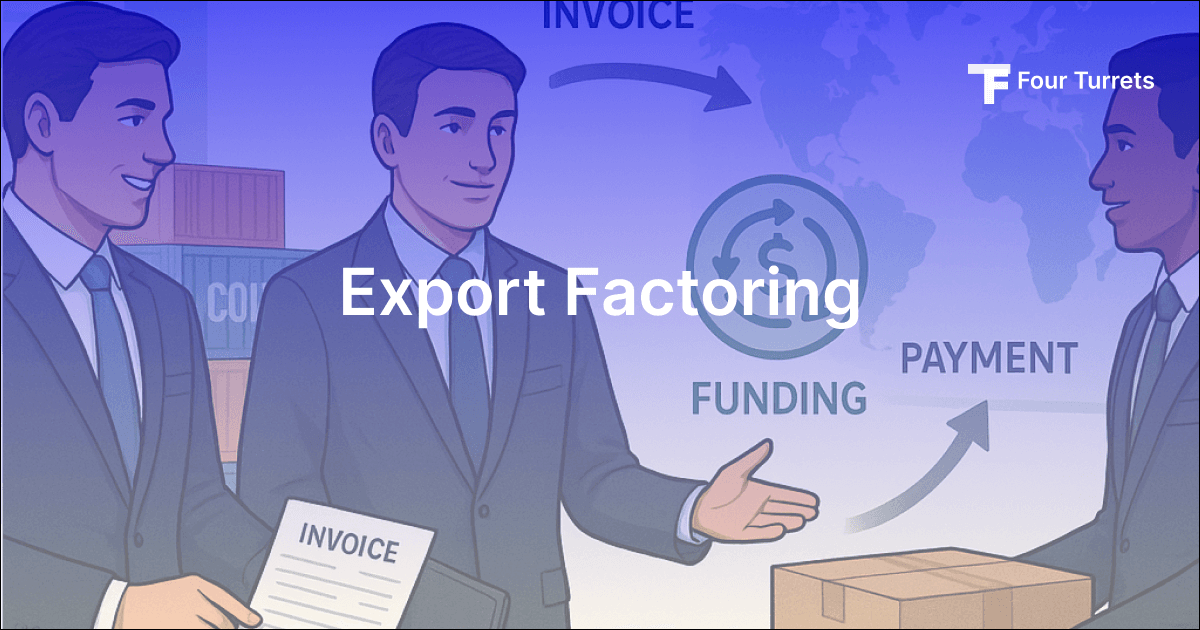In the global trade, exporters often face unique challenges – delayed payments, risk of non-payment, and the constant need for working capital. As an entrepreneur or business owner, especially in India’s dynamic export sector, finding reliable export finance solutions is crucial for sustainable growth. One such solution gaining traction is export factoring, a powerful tool that not only accelerates cash flow but also offers credit protection and professional receivables management.
In this comprehensive guide, we’ll explore what export factoring is, how it works, its benefits, and why it’s becoming the preferred choice for exporters worldwide.
What is Export Factoring?
Export factoring is a financial service where a specialized company (the “factor”) purchases your export receivables (invoices) at a discount and provides you with immediate cash, typically 70 to 90% of the invoice value. The factor then manages collections from your foreign buyers and, upon payment, remits the balance (minus fees) to you. Unlike traditional loans, export factoring is not recorded as debt and is based on your buyer’s creditworthiness, not your own.
Key Features:
- Immediate cash flow against export invoices
- Credit protection against buyer non-payment (in non-recourse factoring)
- Professional management of collections and bookkeeping
- No additional collateral required
- Flexible and scalable as your export orders grow
How Does Export Factoring Work? (The Process)
Export factoring is designed to be straightforward and efficient. Here’s a step-by-step breakdown:
- Agreement with Factor: You sign an agreement with a factoring company, outlining terms and fees.
- Shipment & Invoicing: You ship goods to your foreign buyer and issue an export invoice.
- Invoice Submission: You submit the export invoice to the factor.
- Advance Payment: The factor advances 70-90% of the invoice amount, often within 48 hours.
- Collections: The factor manages collections from your foreign buyer, handling all follow-ups and paperwork.
- Final Settlement: Once the buyer pays, the factor remits the remaining balance to you, after deducting their service fee.
Types of Export Factoring:
- Recourse Factoring: You retain the risk of non-payment by the buyer.
- Non-Recourse Factoring: The factor assumes the risk of non-payment, providing credit protection.
Benefits of Export Factoring
Export factoring offers a range of advantages for exporters, especially those dealing with international clients and long payment cycles:
1. Immediate Cash Flow
No more waiting 30, 60, or even 120 days for foreign buyers to pay. Export factoring provides instant working capital, enabling you to fulfil new export orders, pay suppliers, and invest in business growth.
2. Credit Protection
Non-recourse export factoring shields you from the risk of non-payment or buyer insolvency. The factor evaluates your buyer’s creditworthiness and assumes the risk, giving you peace of mind.
3. Professional Receivables Management
Factoring companies handle collections, bookkeeping, and even dispute resolution, freeing up your resources to focus on core business activities.
4. No Additional Collateral
Unlike bank loans, export factoring is unsecured and does not require you to pledge assets. Approval is based on your buyer’s credit profile, making it accessible for new and growing exporters.
5. Scalable Financing
As your export business grows, so does your access to funding. The more invoices you generate, the more working capital you can unlock.
6. Enhanced Competitiveness
With improved cash flow, you can offer better payment terms to your foreign buyers, win larger contracts, and expand into new markets.
Types of Export Factoring
Export factoring can be tailored to your business needs:
- Discount Factoring: Advance payment based on receivables before importer payment.
- Collection Factoring: Payment is made when receivables are due, reducing the risk of non-payment.
- Open Account Factoring: Ideal for exporters selling on open account terms, common in global trade.
Export Factoring vs. Export Finance
While both aim to support exporters, there are key differences:
- Export Factoring: Involves selling receivables for immediate cash and transferring credit risk to the factor.
- Export Finance: Typically refers to loans or advances against confirmed export orders or receivables, focusing more on funding than on credit management.
Who Should Use Export Factoring?
Export factoring is ideal for:
- Exporters with regular foreign sales and open account terms
- Businesses seeking to improve cash flow and reduce credit risk
- Companies looking to outsource receivables management
- New exporters with creditworthy foreign buyers
Limitations of Export Factoring
- Cost: Factoring fees can be higher than traditional bank financing.
- Customer Relationship: The factor’s involvement in collections may affect your relationship with buyers.
- Not for All Businesses: Companies with low margins or high invoice disputes may find it less suitable.
Export Factoring in India
In India, export factoring is primarily offered by NBFCs and specialized trade finance companies. Banks also support export factoring, but NBFCs often provide more flexible solutions. Exporters with a good track record and established sales history are best positioned to benefit.
1. What is the export factoring process?
Export factoring involves selling your export invoices to a factor, receiving an advance (usually 70-90%), and letting the factor handle collections and credit risk. Once the buyer pays, you receive the balance minus fees.
2. Can a new exporter deal with export factoring?
Yes, new exporters can use export factoring, provided their foreign buyers have good creditworthiness. The factor’s decision is based more on the buyer’s profile than the exporter’s.
3. Do banks support export factoring?
Yes, many banks and NBFCs in India offer export factoring services, though NBFCs often provide more flexible and tailored solutions for exporters.
Conclusion
Export factoring is a game-changer for exporters seeking immediate cash flow, credit protection, and streamlined receivables management. Whether you’re a seasoned exporter or just starting, leveraging export factoring can help you scale your business, reduce risk, and stay competitive in the global marketplace.
If you’re ready to explore export factoring or need expert guidance on trade finance, connect with our team at Four Turrets for personalized solutions.







